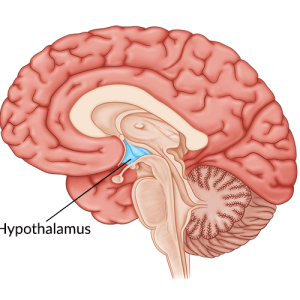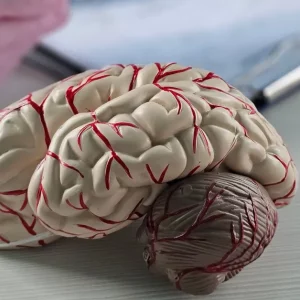Service dogs can make a huge, positive impact on the lives of TBI survivors. Having a TBI service dog can boost social participation, reduce feelings of isolation, and promote independence among survivors with physical impairments or other serious medical conditions.
This article will discuss the many advantages a TBI service dog can offer and why dogs can be great companions for brain injury survivors. Use the links below to jump directly to any section of this article:
- What is a service dog?
- Benefits of TBI service dogs
- Boosting recovery
- How to learn more about TBI service dogs
What is a Service Dog?
The term “service dog” refers to a dog that is individually trained to perform specific task(s) to assist a person with a disability. For example, TBI service dogs can help make living with the effects of brain injury much easier by:
- Assisting with balance and transfers
- Pressing buttons, opening doors, or retrieving items
- Providing guidance if vision is significantly impaired
- Reminding individuals to take their medications on time
- Alerting survivors of a potential upcoming medical crisis, such as a seizure or panic attack
Every traumatic brain injury is unique. This means the symptoms a person experiences will vary depending on a number of factors, such as the location and severity of their injury. TBI service dogs may be able to help survivors in a number of ways, depending on what secondary effects they may experience.
Service dogs may be able to help with physical, cognitive, sensory, and/or emotional challenges after brain injury. However, it is important to note that while service dogs may provide emotional support, dogs who serve in only this capacity are not considered service dogs. According to the Americans with Disabilities Act, service dogs are generally allowed to go anywhere the general public may go, even if pets are not allowed.
Benefits of TBI Service Dogs
Service dogs are often trained through specially designed programs in order to learn the skills needed to assist their owners. The following are just a few of the ways a service dog can be trained to assist individuals after a brain injury.
Mobility Assistance Dogs
Service dogs may be able to assist TBI survivors with physical conditions that impair their mobility, such as hemiplegia, spasticity, or foot drop. In these cases, service dogs can:
- Provide balance support
- Assist with opening doors and cupboards
- Retrieve items
- Turn lights on or off
- Assist with transfers to a chair, bed, shower or toilet
In addition to helping with these tasks, TBI service dogs can also be trained to get help for their owners as needed. This can be a very important skill for owners who are at risk of falling.
Service Dogs for Memory Assistance
Memory problems after a brain injury may cause individuals to forget important tasks, like eating or taking medications. Memory assistance service dogs are trained to remind individuals of these essential daily activities through tasks such as bringing pillboxes to their owners.
In addition, brain injuries often cause people to get overwhelmed and confused, especially when out of the house. If a survivor gets lost and can’t think clearly, a service dog can guide them home safely. This can provide survivors and their families more peace of mind about the individual leaving the house and going out into the community.
Seizure Alert Dogs
Service dogs can also be beneficial for TBI survivors with epilepsy or other conditions that make people lose consciousness. Before a seizure occurs, the human body emits a distinct scent undetectable to humans. It is hypothesized that seizure alert dogs use that scent to detect when a seizure is likely to occur.
To alert their owner that a seizure is imminent, many seizure alert dogs display attention-getting behaviors, such as licking or standing next to their owner seconds to hours before the seizure occurs. This can allow the person time to take anti-seizure medication and get into a safe position to avoid injury.
Likewise, a service dog can help people with autonomic dysfunction, which can causes fainting spells, by warning them when an episode is about to occur. Having a service dog that can warn of a seizure or fainting spell can give TBI survivors the confidence they need to be active outside the house, improving their overall wellbeing.
Psychiatric Service Dogs
Brain injuries have been linked to a number of mental health conditions, including depression, anxiety, and post-traumatic stress disorder. Especially common among veterans, psychiatric service dogs can be trained to help individuals manage their mental health symptoms. This can include performing tasks such as:
- Alerting or redirecting their owner when negative symptoms, such as flashbacks, are likely to occur
- Providing deep pressure or other tactile stimulation to help their owner calm down in cases of sensory overload
- Retrieving medication when their owner would be unable to get it themselves, such as during a panic attack
- Providing a sense of security and protection
In addition to these skills, psychiatric service dogs can reduce stress, boost emotional wellbeing, and relieve feelings of isolation. Therefore, having a service dog can greatly ease psychiatric symptoms and promote engagement in daily life.
Boosting Recovery with a TBI Service Dog
Having a service dog can also encourage brain injury recovery. Service dogs can provide companionship and give their owners a sense of purpose. Caring for a service dog can boost activity levels, which can encourage a fuller recovery.
Tasks such as feeding and brushing service dogs can improve fine motor skills. Furthermore, owners may feel motivated to routinely take their service dogs out on a walk, which can enhance both physical and mental health.
Although not their primary objective, service dogs can also offer emotional support. Even simply petting a dog for just a few minutes increases the production of the hormone oxytocin, which reduces stress and promotes positive emotions.
Studies have shown that having a service dog can greatly improve psychosocial health, including better social, emotional, and work/school functioning. It has also been found that service dogs can reduce the mental burden associated with daily activities, and instead promote wellbeing.
To further demonstrate these benefits, a 2023 study summarizing the results of a survey completed by over 200 service dog owners found that:
- 96% reported benefits of their emotional connection with their dog
- 97% believed their community participation improved
- 96% reported greater physical activity levels
- 98% experienced improved psychological wellbeing
- 97% reported better quality of life
- 78% were able to reduce prescription medication use
- 83% reported their need for paid or unpaid assistance decreased
These benefits can be extremely impactful, not only for an individual’s daily life, but also for their recovery outcomes. Therefore, having a TBI service dog can be a great way for individuals to improve their quality of life while also promoting recovery.
How to Learn More about Service Dogs for Traumatic Brain Injury
There are so many positive effects a service dog have on TBI survivors. The benefits listed in this article are only a few of all the ways a dog could help survivors transform their recovery and adjust to new life circumstances.
Many individuals may be interested in getting a TBI service dog but don’t know where to start. Assistance Dogs International, Inc. specializes in helping individuals find training facilities and connecting assistance dogs with their owners. Check out their website to learn more about nearby training locations and how to start the process of looking for a TBI service dog.










